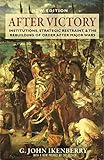After victory : institutions, strategic restraint, and the rebuilding of order after major wars / John G. Ikenberry.
Material type: TextLanguage: English Publication details: New Jersey : Princeton University Press, 2019.Edition: New edition with a new preface by the authorISBN:
TextLanguage: English Publication details: New Jersey : Princeton University Press, 2019.Edition: New edition with a new preface by the authorISBN: - 9780691169217
| Item type | Home library | Collection | Call number | Status | Date due | Barcode | |
|---|---|---|---|---|---|---|---|
 Print
Print
|
OPJGU Sonepat- Campus Main Library | Textbooks | 327.1 IK-A (Browse shelf(Opens below)) | Available | 150488 |
"The end of the Cold War was a "big bang" reminiscent of earlier moments after major wars, such as the end of the Napoleonic Wars in 1815 and the end of the World Wars in 1919 and 1945. Here John Ikenberry asks the question, what do states that win wars do with their newfound power and how do they use it to build order? In examining the postwar settlements in modern history, he argues that powerful countries do seek to build stable and cooperative relations, but the type of order that emerges hinges on their ability to make commitments and restrain power. The author explains that only with the spread of democracy in the twentieth century and the innovative use of international institutions--both linked to the emergence of the United States as a world power--has order been created that goes beyond balance of power politics to exhibit "constitutional" characteristics. The open character of the American polity and a web of multilateral institutions allow the United States to exercise strategic restraint and establish stable relations among the industrial democracies despite rapid shifts and extreme disparities in power. This volume includes a new preface reflecting on the reverberating impact of past postwar settlements and the lessons that hold contemporary relevance. Blending comparative politics with international relations, and history with theory, After Victory will be of interest to anyone concerned with the organization of world order, the role of institutions in world politics, and the lessons of past postwar settlements for today. It also speaks to today's debate over the ability of the United States to lead in an era of unipolar power."--
There are no comments on this title.

